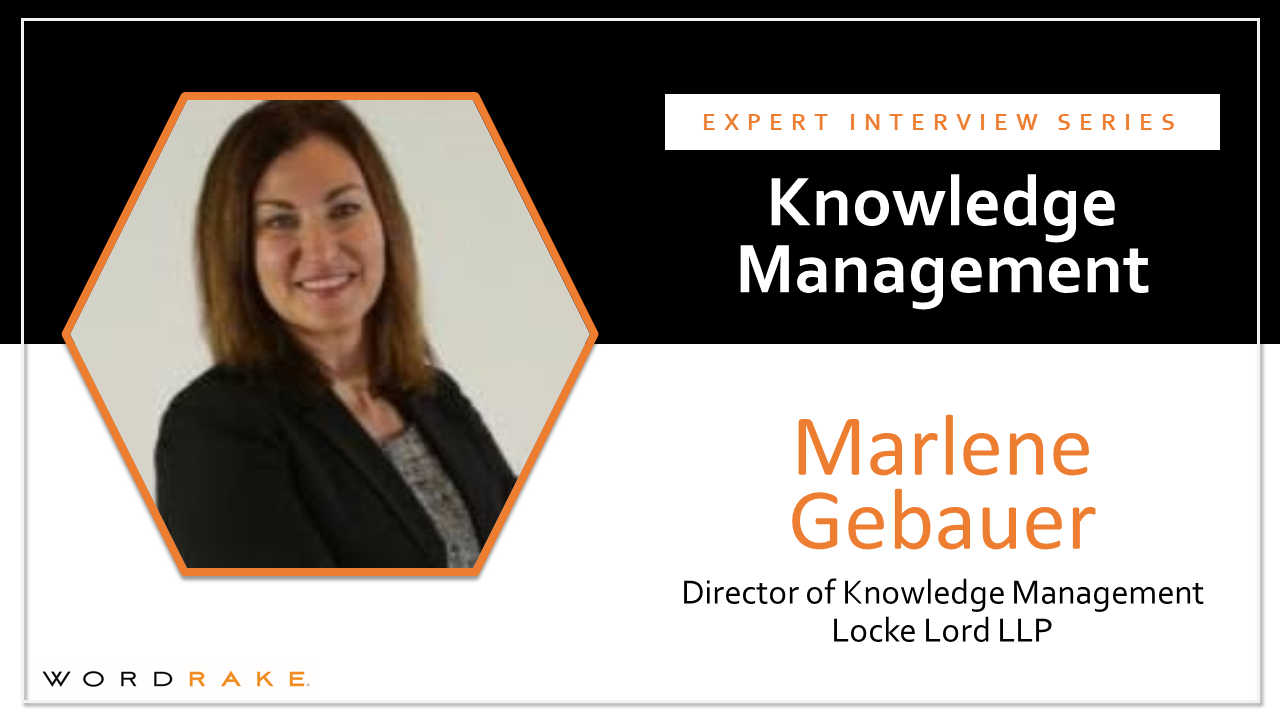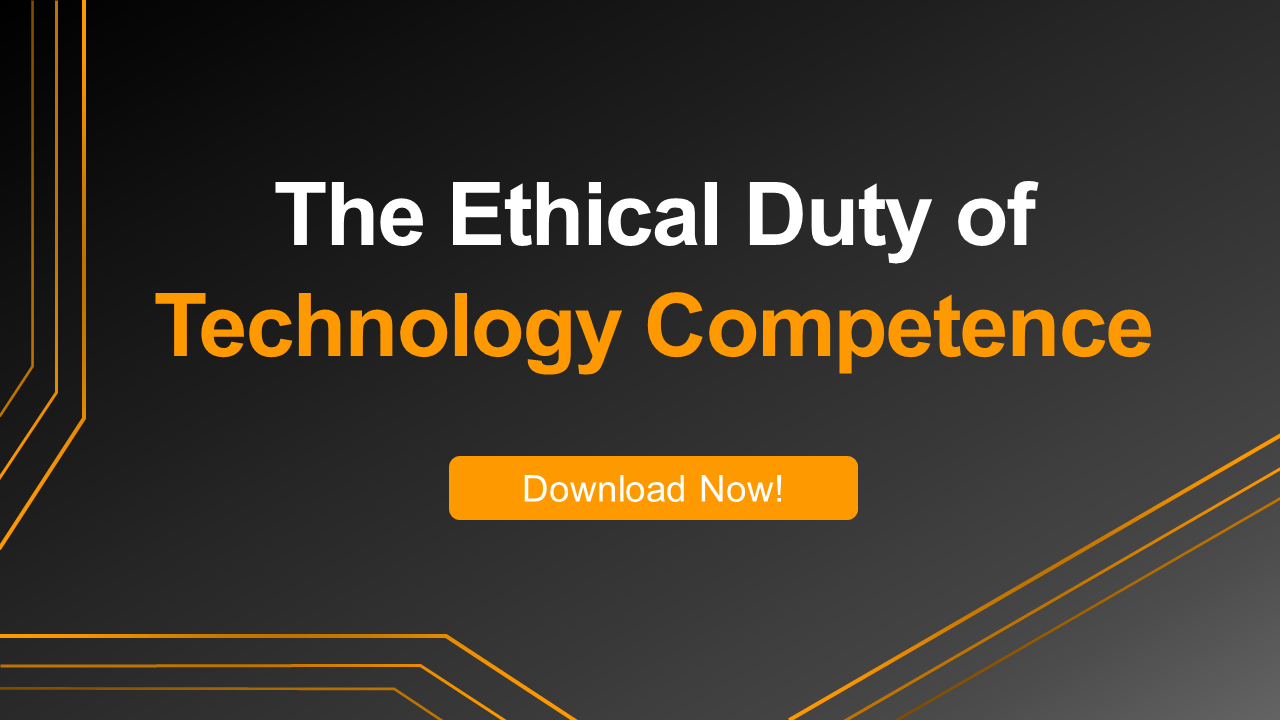There are many barriers to effective knowledge management in law firms, but human emotions around ownership and workplace culture can be some of the hardest to overcome. In this interview, knowledge management expert Marlene Gebauer sheds light on the barriers to knowledge management, including the need to rethink teamwork between people and between technologies. She also details how knowledge management and technology can affect document creation, and who will make a good fit to enter the dynamic knowledge management field. Read on to learn more.
What is your current role and how is it related to knowledge management and innovation?
I am the Director of Knowledge Management at Locke Lord, which is part of the Practice Support department. I oversee Knowledge Management, Training, Information Services, and IP Docketing. I work closely with our Attorney Development, Intake and Conflicts and Litigation Support teams. Recently, I became a member of our Innovation Task Force, which works to identify potential areas for innovation and to collaborate with owners and experts to design and adopt successful legal business solutions.
How are knowledge management and practice innovation connected? What is a key difference and why are the roles often combined?
This may sound controversial, but even though I am part of an innovation task force at my firm, I am a little skeptical of the innovation titles popping up more and more. I’m not skeptical because innovation is unneeded—in fact, it’s quite the opposite. We need everyone to be part of the innovation journey, now and forever. I worry that, by having innovation-specific titles, firms give the impression that innovation belongs to one person or group. These specialist roles suggest that innovation is this behemoth of change that can only be addressed by a specialized group. This isn’t true. Innovation can be small and everyone can contribute. Innovation can even be as simple as putting together a shared team project plan for a series of office moves, which is small but needed. I think innovation teams work best as collaborators, communicators, contributors, and conduits in the innovation process, but not controllers.
I have spoken about incremental change and, while I know there is a space for sweeping change, most of the time, incremental change is what is moving the ball down the field. Innovation should come from a need, not as its own goal, and defining need usually comes from the ground up. Since defining need is often a grassroots effort, attorneys and business professionals are best equipped to determine where change is needed. Of course, proposals must be vetted and evaluated, and ultimately approved at the executive level, but a pitch from a team of expert professionals and attorneys seems stronger to me than from someone who is removed from the problem to be solved and the solutions offered.
People who should define and lead change or innovation initiatives are the people who know and understand the space, along with a team to support them. The team will vary depending on the project. For example, a team might look like the business professionals who regularly evaluate the tools and processes in the industry; project managers; the practitioners who it will impact; technologists; practice managers; and maybe even clients for a shared project.
How do knowledge management, library, innovation, and technology roles work together? What are the dividing lines?
Whether these roles are separate or combined depends on the business culture and needs of a particular organization. One size does not fit all. For any of these functions to be successful, they must work as a team. I cannot stress that enough. This isn't a zero-sum game—everyone can have a slice of the reward pie. Everyone needs to believe they are playing for the same team, regardless of their department or role, and that successes are viewed and rewarded as such. If you can do that, you find that many of the territorial bumps are easier to manage, if they arise at all. So long as you commit to a team approach, you can work out job descriptions and organization charts to keep people in their lanes (which is sometimes necessary). All these groups overlap in some respects, and all can fit very well together—when they do, you have a powerhouse!
What are the biggest technical, procedural, and cultural barriers to capturing knowledge?
You would think knowledge capture and sharing would be easy—I mean we do it all the time. We grow up with so many examples—older siblings teaching younger ones, study groups, learning to ride a bike, etc. In professional life we see its impact constantly in areas like marketing, research and development, acting (yes, you would be amazed at how many classes actors take together to hone their craft), and playing music. In the legal field we share and capture knowledge as well, often informally, like when a more seasoned attorney bestows some hard-learned wisdom upon an associate. Legal has some knowledge capture challenges that are universal, and some that are unique to the practice. A few I find particularly troubling are these:
Technical: We work with multiple technologies that began as siloed solutions, and now we want these technologies to communicate and share information—unfortunately, they do not necessarily work together well as a suite. It is difficult to streamline and move away from known platforms to more flexible ones because of the overall cost, necessary learning curve, and competing valuations and use of platforms by groups with different needs.
Ethical Requirements: Lawyers have special ethical responsibilities to their clients which make it challenging to adopt new technologies and share content. Heightened security and privacy concerns, ethical walls, and records retention schedules require complex solutions, regular monitoring, and data hygiene efforts. Some clients specifically forbid their intellectual property, in the forms of deal structure, forms, and memos, to be recycled, even in part, for matters other than their own. Ethical obligations, coupled with the use of technical silos, deter the development of a sharing culture.
Vendors: Oh, what I wouldn't give for universal standards and neutral sharing platforms for content, both internal and external. We see glimmers of this utopia in things like SALI matter naming conventions, but often vendors just want to use their commercial platforms to push their own information solutions or have their competitors push content through their platform. Thankfully, we are seeing more API solutions offered from vendors, and enterprising firms and departments can do some interesting things—if they have the time and money to commit and if there is significant ROI.
Procedural Norms: Just kidding. That isn’t a thing. Well, maybe in some organizations, but no one likes it. Everyone has their own norms for knowledge capture and sharing. And no one wants to change how they do things. So, any capture solution must be flexible enough for anyone to incorporate it into their own way of doing things, or it won’t be adopted willingly.
Business Culture: We are at a point where there is a lot of uncertainty in firms. The COVID crisis has made it harder to predict markets and business trends, so firm decision-making reflects this. Overall, things seem to be going well financially, but firms are hesitant to invest in tools and processes or change management without obvious need. Adjustments were necessary for COVID related reasons, but in many instances, knowledge management and innovation have stalled and even taken a step backward in the last year. The firms and departments that come out on top will be those that understand the ROI of knowledge capture and use, and can extrapolate how investment in it positively impacts profitability and client relationships.
Do you believe that incentive structures impact knowledge management and sharing? How do knowledge managers overcome information hoarding?
Sharing knowledge isn't something historically done or rewarded in law firms. Firms are made up of many individual practices, and those practices are rewarded based on profit generated. Yes, overall profit pays the overhead to run the business, but every attorney is assessed individually, based on the profit they generate. Those who generate the most are rewarded accordingly. So, the safest way to get the most reward is to be responsible for relationships with as many well-paying clients as possible and share that work with the fewest people needed to do it. Sharing insights outside the necessary scope of people could result in you receiving less of the pie—because now others can do what you do.
Knowledge managers have an uphill battle here. Until the reward structure is built on sharing knowledge to strengthen the firm as a whole, the focus has to be on areas that are not perceived to be as threatening. Thankfully, there are many such options in the areas of automation, ease of access, productizing content, and document production and review.
How can knowledge management improve document creation?
Firms can best distinguish themselves via the shared insights and experience of their attorneys and legal business professionals. Firms expect to benefit from the entirety of a firm’s knowledge. For drafting, being able to access and apply the most convincing legal arguments or the most airtight clauses requires the ability to spin those up in the right circumstances. Only using content from one or even a few individuals puts the drafter at a disadvantage. Having tools that review the entire firm universe of documents and which can recognize and proffer the sorts of templates you seek, complete with the basic styling, structure, and naming conventions for paragraphs and clauses, gives attorneys and clients the peace of mind that proper drafting due diligence is performed. Tools that recognize industry standard composition, like WordRake, and those that highlight errors like inconsistent definitions or numbering also support drafting due diligence.
How can we harvest knowledge from existing work?
Harvesting knowledge from existing work can be as simple as a binder or folder of templates, or as advanced as automated document creation software.
What skills do you need to be a knowledge management professional?
Knowledge management professionals who are strategic, tactical, creative, and empathetic bring valuable strengths to their roles. Other experiences that could lead to success include risk management, data governance, design thinking, project management, basic tech norms, and research and development. While you don’t need to be a technologist to be a knowledge management professional, like in most every job, the more you know, the better. Look for ways to develop an understanding of why and how people do what they do and to gain a working knowledge of areas that regularly touch on knowledge projects. Get acquainted with the basic principles for firms and departments. Finally, if you are inquisitive, process driven, and always striving for improvement, you have likely found your tribe.
There’s no one specific skill or background because it’s all about being a change agent—and change agents connect with people. A knowledge management professional must spin ideas in the context of what will work and how it will work, while understanding and managing the audience’s concerns. I think that’s one of the reasons why successful knowledge management professionals have such varied interests and backgrounds. I was recently on a call where several knowledge management professionals were asked what they would do if they had a dream job. The range of answers (fashion designer, stylist, novelist, musician, and travel blogger among others) reinforced to me that the door is open for all kinds in knowledge management.
What are examples of challenges you encounter in doing your work?
I will qualify that these are challenges I have experienced over my career, not at one particular workplace.
Territoriality: Siloed practices or departments can be territorial about their work product and techniques. They may have trouble trusting others in the workplace enough to share their knowledge about these assets.
Individual De-Prioritization: Lack of focus on knowledge management because people are so busy with urgent tasks.
Organizational Roadblocks: Lack of strategic vision across the organization. Lack of understanding of return on investment, or how to get it. Knowledge management incentive systems that don’t motivate people to contribute. Outdated or conflicting legacy systems.
Budget: Budget constraints limit resources that can be dedicated to a project, which limits possible solutions and slows down progress.
About Marlene Gebauer
Marlene Gebauer is a former practicing lawyer and Director of Knowledge Management at Locke Lord, LLP, where she oversees several practice support teams including Knowledge Management, Training, Information Services, and IP Docketing. She is a founding member of her firm's Innovation Task Force, which focuses on large-scale initiatives impacting multiple practices and departments. Marlene has created innovation hubs, developed insight and analytics products, and instituted KPI and empirical success standards in law firms. She speaks and writes on knowledge management and innovation for organizations such as ILTA, ARC, and AALL. She also teaches law school classes at Vanderbilt University, the University of Houston, the University of Arizona, and Emory University. Marlene is the co-host of the award-winning Geek in Review podcast, where she interviews experts in LegalTech, knowledge management, innovation, analytics, diversity and inclusion, future forward lawyers, and many other topics. For more from Marlene, connect with her on LinkedIn, follow her on Twitter, or listen to the Geek in Review podcast.
About the Knowledge Management Interview Series
This interview is part of a collection of interviews about knowledge management work. Lawyers are the original knowledge workers and knowledge is a key asset in the legal field. By producing this series, we hope to show how document creation fits with innovation and knowledge management goals.
Documents are highly valued for their outcomes, but undervalued as knowledge assets. Create better, more meaningful documents with WordRake. WordRake is clear and concise editing software designed for people who work with confidential information. The software improves writing by simplifying and clarifying text, cutting legalese, and recommending plain English replacements. WordRake runs in Microsoft Word and Outlook, and its suggestions appear in the familiar track-changes style. Learn about our 2-week enterprise pilot or try an individual license of WordRake for free for 7 days.







